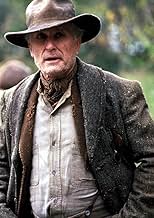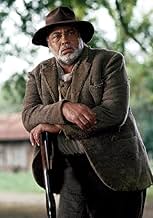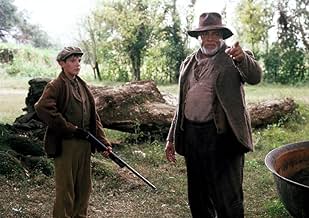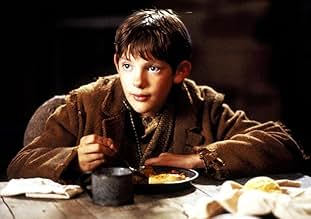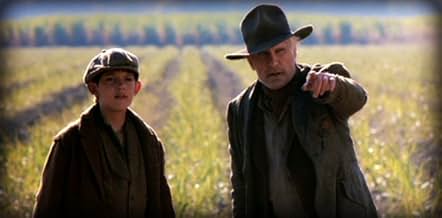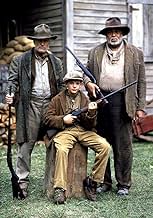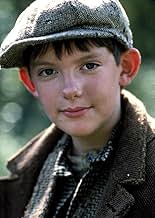Agrega una trama en tu idiomaHorton Foote's story of a teen-aged boy in the Depression who finds work on an eccentric's sugar plantation and learns life's surprising lessons from the team of convicts who also work there... Leer todoHorton Foote's story of a teen-aged boy in the Depression who finds work on an eccentric's sugar plantation and learns life's surprising lessons from the team of convicts who also work there.Horton Foote's story of a teen-aged boy in the Depression who finds work on an eccentric's sugar plantation and learns life's surprising lessons from the team of convicts who also work there.
Bob Edmundson
- Overseer
- (as Robert Edmundson)
Opiniones destacadas
Soll (Robert Duval) is a sugar plantation owner in southern Texas, 1902. We catch up with him on the last day of his life when he is not doing so well, having become quite senile. He repeats himself, relives old events, asks the same questions multiple times (getting the same answers). As might be expected, Duval creates a believable character, but I have to admit that spending an hour and a half with Soll served mainly to convince me of how difficult it would be to deal with such a person.
I wasn't there, so I don't know what things were like in southern Texas at the turn of the century, but the atmosphere created in this movie struck me as believable. I had never understood that some of the southern plantations were sugar cane plantations, so that was interesting to see portrayed. At the time of this movie the workers in the field were leased convicts, almost exclusively black. It seems that over three decades after the Civil War the only change in plantation workers was from slaves to leased convicts, who were treated as slaves. Soll did trust one black man (played by James Earl Jones) to help run the plantation. You got the feeling from this film that a certain era was slowly nearing an end from a time when people like Soll proudly wore his Confederate uniform and convicts were treated like slaves to somewhat better times (convict leasing was abolished in Texas in 1910). Soll can be seen as a symbol for a way of life that had grown old and no longer viable.
I was impressed with how Horace, a teenage white boy in the house, was so patient with Sol. The relationship between Soll and Horace was a key element in the movie--as one man was leaving the earth a young man who was more understanding and patient was taking his place. I imagine Horace's experiences on the plantation were something for him to sort through for the rest of his life, particularly the racial issues.
The movie is based on a play and much of it gives evidence to that fact.
I wasn't there, so I don't know what things were like in southern Texas at the turn of the century, but the atmosphere created in this movie struck me as believable. I had never understood that some of the southern plantations were sugar cane plantations, so that was interesting to see portrayed. At the time of this movie the workers in the field were leased convicts, almost exclusively black. It seems that over three decades after the Civil War the only change in plantation workers was from slaves to leased convicts, who were treated as slaves. Soll did trust one black man (played by James Earl Jones) to help run the plantation. You got the feeling from this film that a certain era was slowly nearing an end from a time when people like Soll proudly wore his Confederate uniform and convicts were treated like slaves to somewhat better times (convict leasing was abolished in Texas in 1910). Soll can be seen as a symbol for a way of life that had grown old and no longer viable.
I was impressed with how Horace, a teenage white boy in the house, was so patient with Sol. The relationship between Soll and Horace was a key element in the movie--as one man was leaving the earth a young man who was more understanding and patient was taking his place. I imagine Horace's experiences on the plantation were something for him to sort through for the rest of his life, particularly the racial issues.
The movie is based on a play and much of it gives evidence to that fact.
Like many stage adaptations, this film is a collection of set pieces without a tight overarching narrative. Not only is it adapted from the stage, but from the middle of a three-act play, which serves to remove some of the context; the viewer is just plopped into the middle of this one.
I thought the performances were good overall, but the production was somewhat lacking. Perhaps the streaming version I saw was a bad transfer, but the cinematography was nothing to write home about, the contrast was way too high in many of the daylight scenes, and the colors looked as if the film was shot on old, faded film stock.
A bit of a strange soundtrack too, but I liked it and I thought it was fitting.
I would recommend it if you like Foote, Faulkner, or Duvall.
I thought the performances were good overall, but the production was somewhat lacking. Perhaps the streaming version I saw was a bad transfer, but the cinematography was nothing to write home about, the contrast was way too high in many of the daylight scenes, and the colors looked as if the film was shot on old, faded film stock.
A bit of a strange soundtrack too, but I liked it and I thought it was fitting.
I would recommend it if you like Foote, Faulkner, or Duvall.
Robert Duvall is one of America's treasures. He should be given a Lifetime Achievement Award annually at the Academy Award ceremonies, and this film allows him to demonstrate, once again, how it's done. If you agree, by all means run, don't walk, to your nearest video store and rent "Rambling Rose", another of Duvall's gems...which, incidentally, also co-stars Lukas Haas, another underrated and terrific actor, as he shows in "Convicts". Most of Lukas' contribution is in the form of reaction to Duvall's ramblings, but the two of them, along with everyone else in the film, create a marvelous since of realism. Duvall is a mentally addled old drunk who can't remember that he said the same thing to you a few minutes ago, or what you told him, and it's to Duvall's credit that he manages to avoid being boring, as this sort of character so easily could have been. Duvall's character is also disreputable and mistreats the convict labor he has contracted for to work on his farm, but still you empathize with him. Lukas is, as always, wide-eyed (no one had larger eyes, or used them better) and innocent but not stupid. Horton Foote provided realistic dialog and a sure sense of place. This is a film not only to enjoy, but to study.
"Convicts" is very much a third act sort of film. All the dialogue and character interaction that occurs within it comes out of the long wind-down of a late southern day. And, by extension, the life of its main character, Soll (Robert Duvall).
This is the first collaboration of director Peter Masterson and writer Horton Foote. Six years earlier, the worked together on "The Trip to Bountiful", a film that seems almost action-packed in comparison to this one. Masterson is not necessarily a good director. In fact, he's just barely this side of adequate. The slow pace leaves a lot of room for cinematographer Toyomichi Kurita, who infuses the film with just the right sense of fragile light & warmth.
Because this is essentially a filmed play, with little in the way of editing or directing prowess, it all comes to the acting. As far as I'm concerned there's no flaws here. Robert Duvall and James Earl Jones, two of the best American actors (both born in January 1931), create characters that are wholly real, uninterested in anything besides living. Lukas Haas, a young actor who I was familiar with from "Testament" and "Witness", plays a character very much like his other early roles. He is quiet, withdrawn, slightly scared and sad, somehow. These are qualities that seem natural from him.
Perhaps a title like "Convicts" is a disservice to this film. That title, along with the opening scene, seem to create an image of a far more high-strung western type picture. If slow-paced stage productions don't interest you terribly, you'll want to pass on this one as well. Otherwise, this might be exactly the film you wish they made more often.
Enjoy.
This is the first collaboration of director Peter Masterson and writer Horton Foote. Six years earlier, the worked together on "The Trip to Bountiful", a film that seems almost action-packed in comparison to this one. Masterson is not necessarily a good director. In fact, he's just barely this side of adequate. The slow pace leaves a lot of room for cinematographer Toyomichi Kurita, who infuses the film with just the right sense of fragile light & warmth.
Because this is essentially a filmed play, with little in the way of editing or directing prowess, it all comes to the acting. As far as I'm concerned there's no flaws here. Robert Duvall and James Earl Jones, two of the best American actors (both born in January 1931), create characters that are wholly real, uninterested in anything besides living. Lukas Haas, a young actor who I was familiar with from "Testament" and "Witness", plays a character very much like his other early roles. He is quiet, withdrawn, slightly scared and sad, somehow. These are qualities that seem natural from him.
Perhaps a title like "Convicts" is a disservice to this film. That title, along with the opening scene, seem to create an image of a far more high-strung western type picture. If slow-paced stage productions don't interest you terribly, you'll want to pass on this one as well. Otherwise, this might be exactly the film you wish they made more often.
Enjoy.
Not a finely crafted film by any measure as the editing and directing were intrusive and clumsy, but Robert Duvall gives one of his totally unique and unforgettable performances as an old and very crusty Southern farmer riddled with dementia and poor health. His one day mental decline into death is one of the most fascinating performances I have ever seen in film. If you really love superior acting talent and skill don't miss it, as it is a rare master class to be sure.
Also see it for the well shown and very authentic love/hate, paternal interrelationship between Southern whites and blacks in the Jim Crow era. And, if you like Duvall in this one, see him in another nearly unknown film role just as good or better and one of my all time faves.... a retired Cuban gentilehombre in Wrestling Ernest Hemingway.
Treat yourself. Bigtime.
Also see it for the well shown and very authentic love/hate, paternal interrelationship between Southern whites and blacks in the Jim Crow era. And, if you like Duvall in this one, see him in another nearly unknown film role just as good or better and one of my all time faves.... a retired Cuban gentilehombre in Wrestling Ernest Hemingway.
Treat yourself. Bigtime.
¿Sabías que…?
- ErroresWhen Soll thinks he hears someone in the closet he shoots three times and we see three bullet holes. But when Jackson opens the closet door to investigate, there are four holes.
- Citas
Horace Robedaux: Martha, are you afraid of dying?
Martha Johnson: No, I ain't afraid. Just not ready to go yet.
- Bandas sonorasGolden Slippers
Sung by Jackson
Selecciones populares
Inicia sesión para calificar y agrega a la lista de videos para obtener recomendaciones personalizadas
- How long is Convicts?Con tecnología de Alexa
Detalles
- Fecha de lanzamiento
- País de origen
- Idioma
- También se conoce como
- Horton Foote's Convicts
- Locaciones de filmación
- Productora
- Ver más créditos de la compañía en IMDbPro
Taquilla
- Total en EE. UU. y Canadá
- USD 13,623
- Fin de semana de estreno en EE. UU. y Canadá
- USD 6,347
- 8 dic 1991
- Total a nivel mundial
- USD 13,623
Contribuir a esta página
Sugiere una edición o agrega el contenido que falta

Principales brechas de datos
By what name was Convicts (1991) officially released in India in English?
Responda
